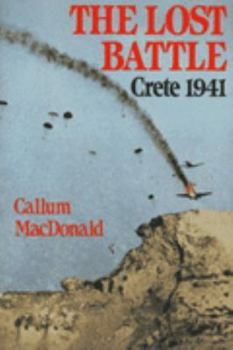The Lost Battle--Crete, 1941: Crete 1941
Select Format
Select Condition 
Book Overview
The invasion of Crete in 1941 should have been a textbook battle, a swift and decisive blitzkrieg, based on tactical surprise. In fact it was based on a series of misjudgements which were to result in... This description may be from another edition of this product.
Format:Hardcover
Language:English
ISBN:0029196256
ISBN13:9780029196250
Release Date:November 1993
Publisher:Free Press
Length:350 Pages
Weight:1.54 lbs.
Dimensions:1.3" x 6.5" x 9.6"
Customer Reviews
1 rating
Good Coverage of the Med and the costly invasion of Crete
Published by Thriftbooks.com User , 14 years ago
I usually try to read two or more books on the same campaign. You always learn something new and you have a better opportunity to judge the authors' efforts. I recently read Antony Beevor's "Crete" which is comparable to his other books in quality. Beevor's analysis of Freyberg, Hargest and Puttick was of a critical nature so a second opinion was desired. In "The Lost Battle", another full length book on Crete, the author implies in his introduction that Freyberg was a victim of circumstance. Some examples would be his recent reinstatement to command and being in theater for a short time, lacked air and armor support and a poor communication network on the island. But he also didn't work well with Wilson and had poor control and communications with his subordinates. With poor control of his forces, deployment and reaction of his forces were inadequate. During the battle, the author does admit that Freyberg did lose periodic control of his forces and that he lost focus on the importance of keeping the airfields. This is more in line with Beevor's appraisal. There is much said about the accuracy and potential of the Ultra messages but which weren't fully taken advantage of by General Freyberg. Both authors have a long, deliberate introduction; Beevor spends a part of it covering the battle and evacuation of Greece while MacDonald spends even more time describing the importance of the Med, Egypt and Middle East to the British Empire. He spends a lot of time describing the early months of the war in Africa against the Italians and how Wavell had to fight Churchill as much as the enemy over the disposition of Allied troops and the defense of Crete and Greece with Wavell's meager force. This portion along with coverage of Student and his paratroopers and Freyberg's profile is so long that it outweighs the actual battle. Another main point in the introductions that the authors disagree is the primary reasons why Hitler attacked Greece and Crete. Mr MacDonald believes the primary reason was to intimidate Churchill into signing a peace treaty. Mr Beevor believes Hitler wanted to stablize his southern flank before starting Operation Barbarossa. Both reasons are valid but I would agree with Mr Beevor. Hitler couldn't begin a major invasion with the Balkans in turmoil or undefended. The coverage of the eleven day battle was good, giving special attention to the key drop zones and landing sites and engagements for the first few days when the outcome was still unsettled. Platanias, Rethymnon, Heraklion, Maleme, Prison Valley, Canea and Suda are the key areas covered. The sea disaster of the 22nd is also covered well. As the end of May draws near and the retreat and evacuation of the forces is nearing completion, the coverage recedes a little. The book ends with the evacuation of the British and NZ troops back to Egypt and elsewhere; there is no coverage of the post evacuation resistance on the island or the German refortification of the island or the kidna






